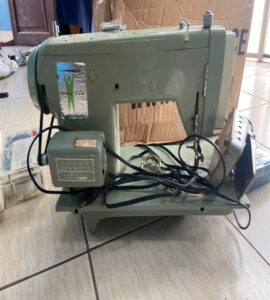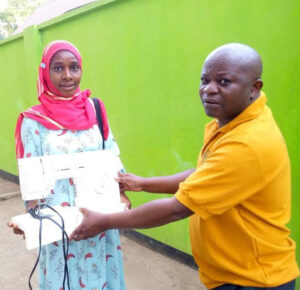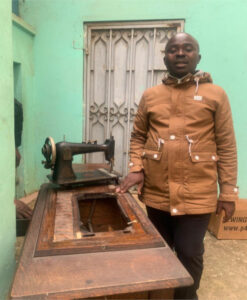By Norbert Mbwiliza
Fall 2023 Newsletter
Date: July 7, 2023
 Introduction: This development report provides an overview of the distribution process and impact assessment of sewing machines that were received from a donor for rural areas in Arusha, Tanzania.
Introduction: This development report provides an overview of the distribution process and impact assessment of sewing machines that were received from a donor for rural areas in Arusha, Tanzania.
The objective was to empower individuals in these communities, particularly women, with the means to start or expand their sewing businesses, thereby contributing to their economic and social development.
Distribution Process:
- Needs Assessment: Prior to the distribution, a comprehensive needs assessment was conducted in collaboration with local authorities, community leaders, and relevant stakeholders to identify the target beneficiaries and assess the demand for sewing machines.
- Selection Criteria: A set of selection criteria were established to ensure that the machines reached those who would benefit the most.
The criteria included factors such as income level, sewing skills, and willingness to commit to using the machines for income-generating activities. - Training Program: To maximize the impact of the sewing machines, a training program was developed to provide beneficiaries with basic sewing skills, machine operation, maintenance, and entrepreneurship training. Local trainers were engaged to conduct the training sessions.
- Distribution: The sewing machines were distributed in a transparent and equitable manner, following the selection criteria. Distribution events were organized in collaboration with local community centers or village assemblies to ensure community participation and accountability.

Impact Assessment:
- Economic Empowerment: The distribution of sewing machines has had a significant economic impact on the beneficiaries. Many individuals, particularly women, have been able to start their own tailoring businesses, generate income, and improve their financial stability. The machines have enabled them to offer sewing services to the community, create employment opportunities, and contribute to the local economy.
- Skills Development: The training provided alongside the distribution of sewing machines has enhanced the beneficiaries’ sewing skills and knowledge. They have acquired technical expertise in operating and maintaining the machines, leading to increased efficiency and quality of their work. This has also fostered a sense of self-reliance and confidence among the beneficiaries.
- Social Impact: The distribution of sewing machines has had positive social implications in the rural areas of Arusha. Women, in particular, have gained increased recognition and respect within their communities as entrepreneurs and providers. The improved economic conditions have also contributed to a higher standard of living, allowing families to access better education, healthcare, and other essential services.

Challenges Faced:
- Limited Access to Electricity: In some rural areas, access to reliable electricity remains a challenge, affecting the operation of the sewing machines. Efforts were made to address this issue by exploring alternative power sources such as solar energy or setting up community charging stations.
- Sustainability: Ensuring the sustainability of the sewing businesses in the long term has been a challenge. Ongoing support and mentorship programs are crucial to help the beneficiaries overcome obstacles, adapt to market demands, and expand their businesses.
Conclusion: The distribution of sewing machines in rural areas of Arusha, Tanzania, has made a significant impact on the economic empowerment and social development of the beneficiaries.
Through increased access to sewing machines and relevant training, individuals, particularly women, have been able to start their own businesses, generate income, and improve their overall well-being. Ongoing support and sustainability efforts are necessary to further strengthen the impact and create a lasting change in these communities.
